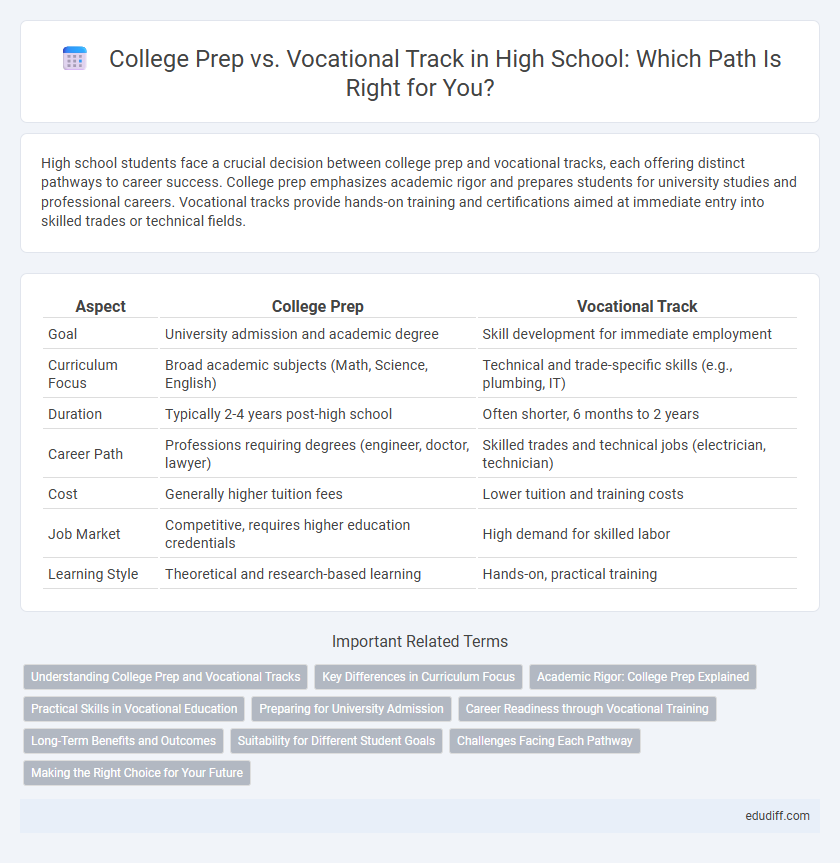High school students face a crucial decision between college prep and vocational tracks, each offering distinct pathways to career success. College prep emphasizes academic rigor and prepares students for university studies and professional careers. Vocational tracks provide hands-on training and certifications aimed at immediate entry into skilled trades or technical fields.
Table of Comparison
| Aspect | College Prep | Vocational Track |
|---|---|---|
| Goal | University admission and academic degree | Skill development for immediate employment |
| Curriculum Focus | Broad academic subjects (Math, Science, English) | Technical and trade-specific skills (e.g., plumbing, IT) |
| Duration | Typically 2-4 years post-high school | Often shorter, 6 months to 2 years |
| Career Path | Professions requiring degrees (engineer, doctor, lawyer) | Skilled trades and technical jobs (electrician, technician) |
| Cost | Generally higher tuition fees | Lower tuition and training costs |
| Job Market | Competitive, requires higher education credentials | High demand for skilled labor |
| Learning Style | Theoretical and research-based learning | Hands-on, practical training |
Understanding College Prep and Vocational Tracks
College prep tracks emphasize rigorous academic coursework designed to prepare students for university admission and success, including advanced placement (AP) classes and college-level subjects. Vocational tracks focus on practical skill development tailored to specific trades or careers, offering hands-on training and certifications in fields like automotive technology, healthcare, and information technology. Understanding the distinct goals and curriculum of each track helps students align their education with future academic or career aspirations.
Key Differences in Curriculum Focus
The college prep curriculum emphasizes advanced theoretical subjects such as mathematics, science, and literature to prepare students for academic rigor in higher education. The vocational track prioritizes hands-on training and practical skills in fields like automotive technology, healthcare, and culinary arts. This key difference in curriculum focus shapes each pathway's approach to student readiness for either college or direct entry into the workforce.
Academic Rigor: College Prep Explained
College prep programs emphasize academic rigor by offering advanced coursework such as AP classes, honors courses, and college-level material designed to develop critical thinking and analytical skills. This track prepares students for the intellectual demands of higher education through a curriculum rich in mathematics, science, literature, and social studies. Vocational track courses tend to focus more on practical skills and hands-on training, making college prep the ideal choice for students aiming for university admission and academic challenge.
Practical Skills in Vocational Education
Vocational education emphasizes practical skills such as hands-on training in trades like carpentry, automotive repair, and healthcare, directly preparing students for specific careers. These programs often include internships, apprenticeships, and industry certifications that enhance employability immediately after graduation. Unlike college prep curricula, vocational tracks focus on applied learning and skill mastery tailored to job market demands.
Preparing for University Admission
College prep courses emphasize rigorous academic subjects like advanced mathematics, science, and literature to align with university admission requirements. These courses develop critical thinking, analytical skills, and standardized test readiness essential for competitive college applications. Vocational tracks focus more on hands-on skills and certifications, which are less prioritized in traditional university admission processes.
Career Readiness through Vocational Training
Vocational training in high school provides hands-on experience and specialized skills that directly prepare students for immediate entry into the workforce, enhancing career readiness. This practical approach contrasts with college prep programs, which emphasize academic achievement and theory aimed at higher education. By focusing on industry-specific competencies, vocational tracks equip students with certifications and real-world expertise that meet labor market demands efficiently.
Long-Term Benefits and Outcomes
College prep programs often lead to higher lifetime earnings, expanded career opportunities, and increased potential for professional growth due to access to advanced degrees. Vocational tracks provide faster entry into the workforce, specialized skills tailored for in-demand trades, and lower student debt, enabling earlier financial independence. Both pathways offer distinct long-term benefits, with college prep emphasizing academic advancement and vocational education focusing on practical expertise and immediate employability.
Suitability for Different Student Goals
College prep programs emphasize rigorous academic coursework designed for students aiming to pursue higher education and professional careers. Vocational tracks provide hands-on training and skill development tailored for students who prefer entering the workforce directly after high school or pursuing technical certifications. Choosing between these paths depends on individual career goals, learning preferences, and long-term aspirations.
Challenges Facing Each Pathway
College prep students often confront intense academic pressure and the high cost of tertiary education, which can lead to stress and financial strain. Vocational track learners may face societal stigma and limited opportunities for career advancement despite gaining practical skills. Both pathways require tailored support systems to address mental health concerns and bridge gaps between education and workforce demands.
Making the Right Choice for Your Future
Choosing between college prep and vocational tracks shapes your career trajectory by aligning education with personal skills and industry demands. College prep offers a foundation for higher education and professions requiring advanced degrees, while vocational programs provide practical skills for immediate employment in trades such as healthcare, technology, and skilled labor. Evaluating labor market trends, salary expectations, and personal interests ensures an informed decision that maximizes long-term success and job satisfaction.
College Prep vs Vocational Track Infographic

 edudiff.com
edudiff.com